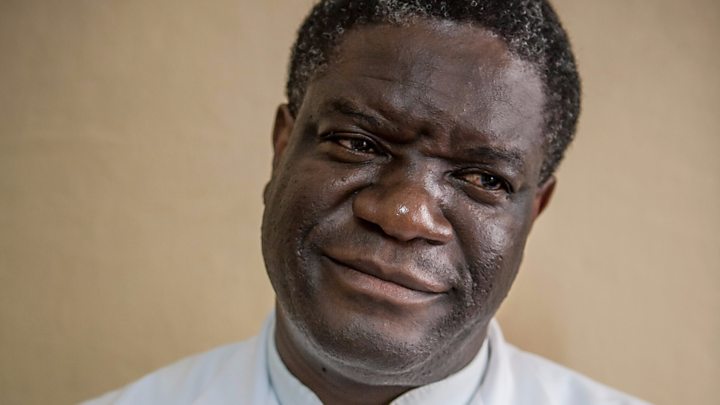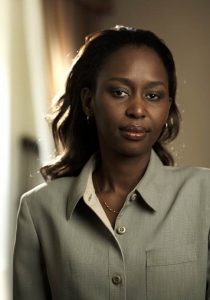In what has been called the “rape capital of the world” by a top UN official, Dr. Denis Mukwege offers hope to women whose attacks destroyed their bodies and now their lives. Before filling a desperate need and specializing in rape trauma surgery, Dr. Mukwege aspired to help women of the Democratic Republic of Congo (DRC) by providing better maternity care. In the DRC, one percent of women die during childbirth (to put it in perspective that is 1 for every 100 which makes Congolese women 8 more times likely to dye than in “developed countries,” where the number is on average of 12 in every 100,000).1 However, shortly after he founded the Panzi Hospital in 1999, Dr. Mukwege’s life took an entirely different course when his first patient was admitted. Instead of looking to have a baby, she sought treatment after suffering a rape where the assailants, from one of the many military groups in the DRC, had shot her in the genitals.2 Shortly after this event, the hospital cared for forty-eight baby girls, all raped by a local mans army, one of the tens of military, paramilitary, rebels, and foreign militant groups who use terror to displace locals and refugees in an attempt to secure natural resources.3 Luckily, these particular rapes stopped after the hospital and other human rights groups convinced a military court to prosecute the case.

Though Dr. Mukwege did not realize it at the time, founding his hospital in Eastern Congo would help him “become the world’s leading specialist in the treatment of wartime sexual violence and a global campaigner against the use of rape as a weapon of war.”4 Caring for more than 3,500 women per year, and sometimes up to 10 women a day, Dr. Mukwege, as well as 370 doctors, nurses and support staff, do more than simply repair women physically, they also work to improve their lives in many meaningful ways.5 They follow a five-pillar method. The hospital works with each woman to provide physical medical treatment, psycho-social therapy, socioeconomic support and training, community reintegration and, finally, legal assistance in done in the order listed. A senior advisor to Dr. Mukwege, Elizabeth Blackney, describes this program as:
“Once [women] get through [their] psycho social and medical healing, [they] move on and work with our socioeconomic pillar [to] learn literacy and numeracy and education. [Women] have a safe space to learn vocational skills. And then we of course provide legal aid and assistance to help people get justice.”6
This work is not done without risk, however, and, in 2012, shortly after giving a speech at the United Nations in which he called for an end to the corruption within the government of the DRC, and stated not enough was being done to stop “an unjust war that has used violence against women and rape as a strategy of war,” five armed men stormed the Mukwege family compound in an attempt to assassinate Dr. Mukwege, his wife, and two daughters.7 While Dr. Mukwege and his family survived, his trusted friend and bodyguard, Joseph Bizimana, died protecting the family.8

Though he fled to Belgium, he returned to the DRC not long afterwards, when women of the DRC sold their harvests and raised money to buy Dr. Mukwege and his family plane tickets back. When asked about his return, Dr. Mukwege told the British Broadcasting Network that “[a]fter that gesture, I couldn’t really say no. And also, I am myself determined to help fight these atrocities, this violence. My life has had to change, since returning. I now live at the hospital and I take a number of security precautions, so I have lost some of my freedom.”9 Despite the danger to his own life, Dr. Mukwege continues to transform the lives of many Congolese women in powerful, positive, and lasting ways. He is the light for thousands of women and continues to champion for the protection of women from current and future horrors that are the hallmarks of the conflict in the DRC since the mid 1990s. Proof of his incredible impacts is a woman named Sarah. Her attackers, after slaughtering her village, tied her to a tree where she was brutally raped by different men for days. When she arrived at the hospital, she was in critical condition, unable to even stand on her own. But, as each day passed, her will to live became stronger, and “[t]oday, Sarah is a beautiful, smiling, strong and charming woman…[who] runs her own business…bought a plot of land…has built a little house [and] is independent and proud.”10 For these efforts and all of his contributions, in October of 2018, he was announced as the co-recipient to the Nobel Peace Prize with Nadia Murad “for their efforts to end the use of sexual violence as a weapon of war and armed conflict.”11
- Jackson Sinnenberg, “‘Dr. Miracle’ Is The Co-Recipient Of The Nobel Peace Prize,” NPR, October 05, 2018, Accessed December 06, 2018, https://www.npr.org/sections/goatsandsoda/2018/10/05/654699946/dr-miracle-is-the-co-recipient-of-the-nobel-peace-prize; “Maternal Mortality,” World Health Organization, February 16, 2018, Accessed December 06, 2018, https://www.who.int/news-room/fact-sheets/detail/maternal-mortality. ↵
- Jackson Sinnenberg, “‘Dr. Miracle’ Is The Co-Recipient Of The Nobel Peace Prize,” NPR, October 05, 2018, Accessed December 06, 2018, https://www.npr.org/sections/goatsandsoda/2018/10/05/654699946/dr-miracle-is-the-co-recipient-of-the-nobel-peace-prize; Dr. Denis Mukwege, “The Nobel Peace Prize 2018,” NobelPrize.org, Accessed April 07, 2019, https://www.nobelprize.org/prizes/peace/2018/mukwege/55721-denis-mukwege-nobel-lecture-2/. ↵
- Mewiga Baregu, “Congo in the Great Lakes Conflict,” In Security Dynamics in Africa’s Great Lake Region, edited by Gilbert M. Khadiagala, 59-79. (Boulder: Lynne Rienner Publishers, Inc., 2006); Dr. Denis Mukwege, “The Nobel Peace Prize 2018,” NobelPrize.org, Accessed April 07, 2019, https://www.nobelprize.org/prizes/peace/2018/mukwege/55721-denis-mukwege-nobel-lecture-2/. ↵
- “Dr Denis Mukwege,” Dr. Denis Mukwege Foundation, Accessed December 06, 2018, https://www.mukwegefoundation.org/story/dr-denis-mukwege/. ↵
- “Nobel Peace Prize Winner: Denis Mukwege from DR Congo,” BBC News, October 05, 2018, Accessed December 06, 2018, https://www.bbc.com/news/world-africa-45759304. ↵
- Sinnenberg, Jackson, “‘Dr. Miracle’ Is The Co-Recipient Of The Nobel Peace Prize,” NPR, October 05, 2018, Accessed December 06, 2018, https://www.npr.org/sections/goatsandsoda/2018/10/05/654699946/dr-miracle-is-the-co-recipient-of-the-nobel-peace-prize. ↵
- “Dr Denis Mukwege,” Dr. Denis Mukwege Foundation, Accessed December 06, 2018, https://www.mukwegefoundation.org/story/dr-denis-mukwege/. ↵
- “Nobel Peace Prize Winner: Denis Mukwege from DR Congo,” BBC News, October 05, 2018, Accessed December 06, 2018, https://www.bbc.com/news/world-africa-45759304. ↵
- Sinnenberg, Jackson, “‘Dr. Miracle’ Is The Co-Recipient Of The Nobel Peace Prize,” NPR, October 05, 2018, Accessed December 06, 2018, https://www.npr.org/sections/goatsandsoda/2018/10/05/654699946/dr-miracle-is-the-co-recipient-of-the-nobel-peace-prize. ↵
- Dr. Denis Mukwege, “The Nobel Peace Prize 2018,” NobelPrize.org, Accessed April 07, 2019, https://www.nobelprize.org/prizes/peace/2018/mukwege/55721-denis-mukwege-nobel-lecture-2/. ↵
- “The Nobel Peace Prize” 2018, NobelPrize.org, Nobel Media AB 2019, (Accessed 7 Apr 2019), <https://www.nobelprize.org/prizes/peace/2018/summary/>. ↵



56 comments
Luis Jaen
This is such an amazing article, I had no idea who Dr. Mukwege was, but this man is a walking miracle. His efforts to stop sexual violence as a war tactic and his treatment to these women is truly inspirational. With the implementation of the five pillars, these women are able to grow from being hopeless to leading amazing lives. Dr. Mukwege has done so much for these women where it was desperately needed. This article is written very well and brings light to a very important topic that we cannot look past. Sexual violence happens all over the world and there is a necessity to make efforts to bring down the rate, or even eliminate it in total.
Lesley Martinez
I’m amazed by the difference one person can make. Dr. Denise Mukwege’s willingness to open the Panzi Hospital and help provide physical, medical, and economic help for the women in the Democratic Republic of Congo is inspiring. His dedication to campaigning against the use of rape as a weapon of war even after an attempt to assassinate him shows his braveness and generosity. It’s sad to hear stories like Sarah’s and know that this is something that women in the DRC have to experience. This is a great article that raises awareness of the efforts to end the use of sexual violence as a weapon of war.
Caily Torres
To me, this article was really touching. Rape is still an ongoing tragedy that leaves victims feeling like they no longer have a purpose in life. Rape takes a toll on not only a persons mental but physical health. Denis Mukwege did everything in his power to help thousands of victims. Mukwege helped victims mentally, physically, financially, and educationally. All these women of different ages left his care feeling like they have a new found purpose in life, they are now striving. I thank doctor Mukwege for helping all his victims.
Arsema Abera
This article is well explanatory in Dr. Denis Mukwege’s work against rape and sexual violence. He has helped so many young women in moving forward and restoring their hope in their lives, seeking justice to the victims and providing better care in reducing the maternity mortality rate. Dr.Mukwege is truly an inspiration and a captivate miracle to the Congolese people.
Sydney Hardeman
This was a very nicely written article. The world needs more people who are like Dr. Mukwege. He made a huge difference in women’s lives in the Democratic Republic of Congo, first by providing better maternity care in order to fight deaths during childbirth, and then by fighting sexual violence in the country, which was a huge issue taking place.
Jacqueline Mendez
This article was a very well written article that between the lines calls for action. Sexual violence is such a common theme nowadays. It’s overwhelmingly common in these countries that make medical attention even harder. Sexual violence victims have to be taken very well taken care off and this Doctor is truly an angel sent from above!
Arturo Canchola
Doctors like Dr. Mukwege are who inspire me to one day become a doctor myself. The amount of impact they can have on a person, and even on a society, is immense. I found it especially interesting that Dr. Mukwege worked in helping victims of sexual violence, a field that is often neglected by the media and even other aspiring doctors. Being able to act out of selflessness in the wake of the civil war in the DRC — valuing the healing of others, even if it could come at the cost of his own life — makes me want to go out and join him in healing the world.
Rosa Robledo Martinez
Overall a great article to read! This article calls for the reasons of why we should help people who had suffered from sexual violence. Dr. Mukwege’s work with helping many women in his community is what many doctors should follow his steps. His work is not only helping a specific target of people but he is helping his community so people can feel good again with no guilt.
Shea Slusser
It’s so refreshing to see what good Dr. Mukwege did for women. His selflessness allowed women to have a stronger and more heard voice within the community, and its important to value the little things like this people do around the world that build up and create a more equal society for women. Great article and even better man.
Victoria Davis
Dr. Mukwege was an outstanding doctor and the practice he did in his community. He made sure these women knew they were not standing alone and that there would be someone besides them that would help fight for justice. He was such an outstanding individual doing more than he ever had to. He was a very important and I hope his story continues to live on.